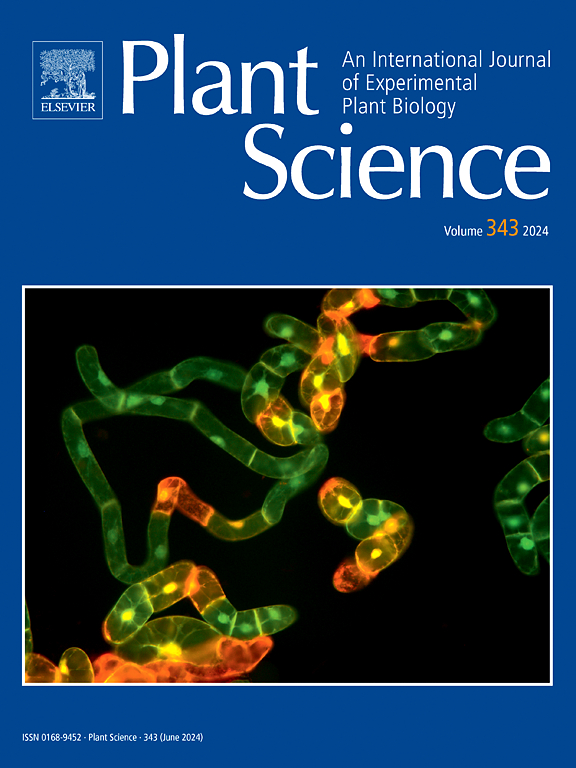The PHD transcription factor ThPHD5 regulates antioxidant enzyme activity to increase salt tolerance in Tamarix hispida
IF 4.2
2区 生物学
Q2 BIOCHEMISTRY & MOLECULAR BIOLOGY
引用次数: 0
Abstract
PHD proteins are an important class of transcription factors (TFs) that are widely distributed in eukaryotes and play crucial roles in many aspects of plant growth, development and response to stress. We identified a transcription factor, ThPHD5, from the PHD family in Tamarix hispida based on its potential involvement in abiotic stress response processes. In this study, the salt tolerance function of ThPHD5 from T. hispida was further characterized. The qRT-PCR results showed ThPHD5 expression was significantly induced by NaCl, PEG and ABA treatments. Transient transformation analysis revealed that ThPHD5 improved salt tolerance in T. hispida by increasing POD and SOD activity, decreasing the MDA, total ROS content and electrolyte leakage. To explore the salt tolerance mechanism of the ThPHD5 TF, its binding DNA motifs and potential downstream regulatory genes were analyzed. The results showed that ThPHD5 affect the expression of 7 antioxidant enzyme-related genes. The Yeast one-hybrid (Y1H) and Electrophoretic Mobility Shift Assay (EMSA) results indicated ThPHD5 could bind to ABRE, MYB and Dof cis-acting elements. ChIP-PCR further confirmed ThPHD5 exercise its regulatory function by directly binding motifs on the ThPOD16, ThSOD and ThSOD1 promoters. Taken together, these findings indicate the ThPHD5 TF improves salt tolerance in T. hispida by regulating the expression of antioxidant enzyme-related genes to increase antioxidant enzyme activity, enhance the ROS scavenge ability, reduce ROS accumulation and cellular damage.
PHD 转录因子 ThPHD5 可调节抗氧化酶的活性,从而提高柽柳的耐盐性。
PHD 蛋白是一类重要的转录因子(TFs),广泛分布于真核生物中,在植物生长、发育和胁迫响应的许多方面都发挥着至关重要的作用。我们在 Tamarix hispida 中发现了 PHD 家族的一个转录因子 ThPHD5,因为它可能参与了非生物胁迫响应过程。本研究进一步研究了ThPHD5的耐盐功能。qRTPCR 结果显示,ThPHD5 在 NaCl、PEG 和 ABA 处理中均有表达。瞬时转化分析表明,ThPHD5通过提高POD和SOD活性,降低MDA、总ROS含量和电解质渗漏,提高了糙叶榕的耐盐性。为了探索 ThPHD5 TF 的耐盐机制,研究人员分析了其 DNA 结合基序和潜在的下游调控基因。结果表明,ThPHD5影响了7个抗氧化酶相关基因的表达。酵母单杂交(Y1H)和电泳迁移分析(EMSA)结果表明,ThPHD5可与ABRE、MYB和Dof顺式作用元件结合。ChIP-PCR进一步证实了ThPHD5通过直接结合ThPOD16、ThSOD和ThSOD1启动子上的基团来行使其调控功能。综上所述,这些研究结果表明,ThPHD5 TF通过调控抗氧化酶相关基因的表达,提高抗氧化酶活性,增强ROS清除能力,减少ROS积累和细胞损伤,从而提高糙叶天牛的耐盐性。
本文章由计算机程序翻译,如有差异,请以英文原文为准。
求助全文
约1分钟内获得全文
求助全文
来源期刊

Plant Science
生物-生化与分子生物学
CiteScore
9.10
自引率
1.90%
发文量
322
审稿时长
33 days
期刊介绍:
Plant Science will publish in the minimum of time, research manuscripts as well as commissioned reviews and commentaries recommended by its referees in all areas of experimental plant biology with emphasis in the broad areas of genomics, proteomics, biochemistry (including enzymology), physiology, cell biology, development, genetics, functional plant breeding, systems biology and the interaction of plants with the environment.
Manuscripts for full consideration should be written concisely and essentially as a final report. The main criterion for publication is that the manuscript must contain original and significant insights that lead to a better understanding of fundamental plant biology. Papers centering on plant cell culture should be of interest to a wide audience and methods employed result in a substantial improvement over existing established techniques and approaches. Methods papers are welcome only when the technique(s) described is novel or provides a major advancement of established protocols.
 求助内容:
求助内容: 应助结果提醒方式:
应助结果提醒方式:


